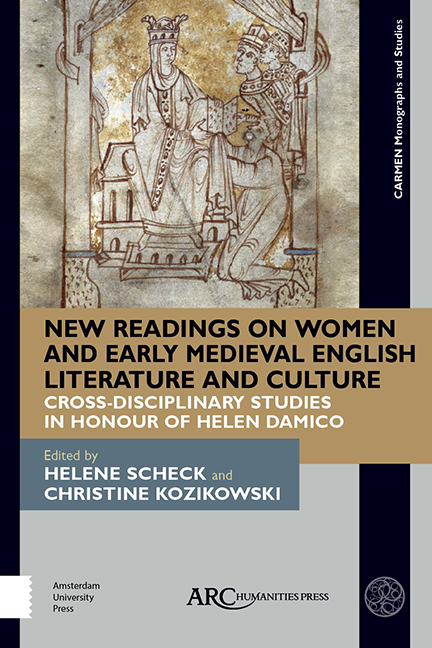 New Readings on Women and Early Medieval English Literature and Culture
New Readings on Women and Early Medieval English Literature and Culture Book contents
- Frontmatter
- Contents
- List of Illustrations
- List of Abbreviations
- Note from the Editors
- Introduction: Feminism and Early English Studies Now
- PART ONE LITERACY AND MATERIAL CULTURE
- PART TWO ENGENDERING MARRIAGE AND FAMILY
- PART THREE WOMEN OF THE BEOWULF MANUSCRIPT
- PART FOUR WOMEN AND ANGLO-SAXON STUDIES
- Select Bibliography
- Index of Manuscripts
- General Index
9 - The Missing Women of the Beowulf Manuscript
Published online by Cambridge University Press: 20 November 2020
- Frontmatter
- Contents
- List of Illustrations
- List of Abbreviations
- Note from the Editors
- Introduction: Feminism and Early English Studies Now
- PART ONE LITERACY AND MATERIAL CULTURE
- PART TWO ENGENDERING MARRIAGE AND FAMILY
- PART THREE WOMEN OF THE BEOWULF MANUSCRIPT
- PART FOUR WOMEN AND ANGLO-SAXON STUDIES
- Select Bibliography
- Index of Manuscripts
- General Index
Summary
IN THEIR INTRODUCTION to New Readings on Women in Old English Literature, Helen Damico and Alexandra Hennessey Olsen called for a corrective turn towards scholarship “centered on women's concerns, in the hopes of generating a more accurate reading of the texts involved and of promoting a more enlightened understanding of the position, role, and function of women in Anglo-Saxon culture and of the meaning of their experience.” They illustrated this problem with the two-part and tripartite readings of Beowulf typified by J. R. R. Tolkien, which largely obscured important moments of women's presence in the poem. Among the scholars answering that call was Jane Chance, whose article revising the tripartite model of Beowulf in light of its women was a part of their original collection. In the decades since the publication of Olsen and Damico's volume, many other scholars have answered their call, and a good number of studies now look to women's presence and concerns in Beowulf. Nevertheless, a corrective codicological reading of the entire manuscript, the second part of British Library, Cotton Vitellius A.xv, has yet to arrive among them.
As it currently stands, this manuscript, also known as the Beowulf manuscript or the Nowell Codex, contains five texts: The Passion of Saint Christopher, Wonders of the East, The Letter of Alexander to Aristotle, Beowulf, and the biblical epic poem Judith. In their attempt to find a common thematic reading across the five texts, scholars ranging from Kenneth Sisam to Andy Orchard have focused on the central three texts— Wonders, the Letter, and Beowulf— which form a more obvious unit of texts with a clear focus on monsters. This scholarship offers thematic readings ranging from the monsters and pride of Andy Orchard to a preoccupation with kingship in Kathryn Powell's work. The unintended consequence, however, is that important women in the manuscript tend to be overlooked.
One should blame the ravages of time rather than scholarly neglect in this case, as the physical state of the evidence is a major impediment. Our only copy of Judith is incomplete, and every manuscript of the full Christopher legend from Anglo-Saxon England is badly damaged. In particular, the Vitellius manuscript has lost about one quire of sixteen leaves from the Passion of Saint Christopher; the losses to Judith are not so easily measured
- Type
- Chapter
- Information
- New Readings on Women and Early Medieval English Literature and CultureCross-Disciplinary Studies in Honour of Helen Damico, pp. 161 - 178Publisher: Amsterdam University PressPrint publication year: 2019


